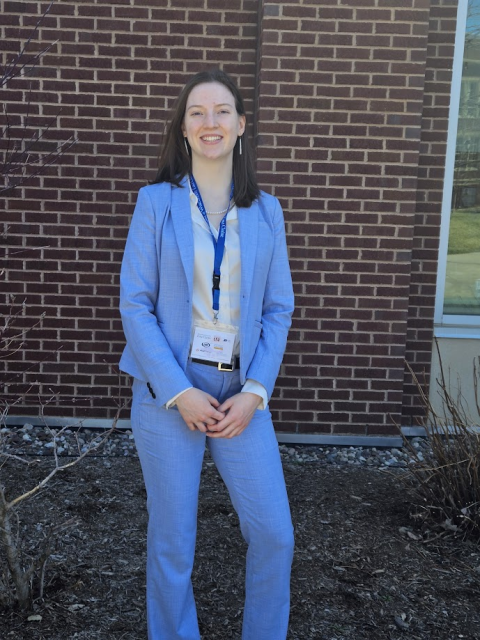Connecting with Research Presentations
Over the past two years, I have been researching Merkel Cell Carcinoma, a rare neuroendocrine skin cancer with very little research on it. Neuroendocrine cancers deal with the interactions of the nervous system and the body’s hormone regulation. Merkel Cell Carcinoma mainly affects the body’s touch receptors and causes people to lose their touch sensation. My focus is on one of the DNA damage repair pathways, the ATR-CHK1 pathway. This repair pathway deals with fixing random mutations in cells that can prevent cancer. Because of this research, and winning a SURF grant through the Hamel Center for Undergraduate Research in the summer of 2022, I was invited to present at the 2023 National Conference for Undergraduate Research which was held at the University of Wisconsin in Eau Claire. I also received a travel grant from the Hamel Center from Undergraduate Research and one from the molecular, cellular, and biomedical sciences department to go to Eau Claire.

I was extremely excited to apply to present at this conference. I decided to do an oral presentation because there are not as many opportunities to do oral presentations at UNH. I was selected to do two different oral presentations. WiSys, a nonprofit organization supporting research, innovation, and entrepreneurship in Wisconsin, hosts a three-minute “Quick Pitch,” session, where I would present a brief overview of my research and its importance. Then, I’d give a fifteen-minute presentation the following day which was more detailed and allowed me to go into my reasoning behind my research and my results.
While developing the presentation, it was difficult to determine what was important to include and what was not. Fifteen minutes sounds like a long time, but when you have dozens of figures to choose from it is hard to narrow down the choices. I ended up presenting ten different figures from my original research. The hardest part of all of this was figuring out how to explain them in a way that made sense for someone who was not in my field. In my final presentation, I had seven slides of background information before I could even get into my actual research. I got lots of feedback from friends, family, and my lab members that I had set the scene nicely for what my research was on, and this made the results more comprehensible.
The first thing that happened once I got to Wisconsin was I realized that they were in a different time zone. I don’t know why that didn’t occur to me before, but it was quite a shock! For my first presentation, I met a group of other students that I hung out with almost every day for the rest of the conference. We practiced our three-minute pitches and even though we were in different disciplines, two science backgrounds and two humanities backgrounds, and were from different places, me from New Hampshire, two from the Midwest, and one from Egypt, we clicked instantly. We all had the same anxieties about presenting three minutes of material from memory, which seems short but really is forever when you are presenting it. I think that because we all practiced together, we did much better, or at least I know that I did!
I preferred my fifteen-minute oral presentation over the three minute presentation. When I was preparing my slides, I practiced them to anyone who would listen. My entire lab heard the presentation, and so did my family. I practiced to myself, and even to my pets. When I got up there and looked out to the room there were about a dozen other students with similar backgrounds and some parents who I didn’t know but were there to support their kids. I felt confident. I knew my material and was, and still am, really passionate about my research. There were no prizes for the oral presentations, but I did well. All my prep work really paid off.
For the rest of the conference, I had two days to do whatever I wanted in Eau Claire. I went to a local art museum and tried out a bunch of local restaurants. I saw performances of local indigenous dancing troupes. I wandered all over campus to see what their campus was like in comparison to UNH. Most importantly I went to other students' presentations to support them, even though I didn’t know them. I saw a wide range of projects, from student composers performing their original music and telling the meaning behind their pieces - to posters about how different bugs live symbiotically with different plants in gardens.
Ultimately, my experience at the NCUR conference was amazing and I recommend all students from any discipline to go. I met students from around the country and outside it and it proved to me that you can find connections with everybody. I learned about the importance of so many different disciplines of research that I never thought about before. I think that it has also helped me develop better presentation skills since I had never really presented at something like that before. I’m excited for the coming year to be able to apply to more conferences and present even more as I continue my research as a master's student at UNH.